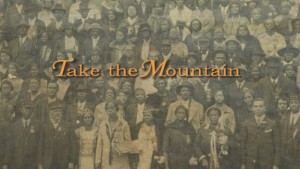OXFORD, Miss. – The documentary short “Take the Mountain” by Deborah Freeland, videographer for the University of Mississippi Division of Outreach, was screened earlier this spring as part of the university’s Black History Month events.
Now the film will be included alongside 64 other independent films chosen for the 12th annual Tupelo Film Festival, taking place this weekend in Tupelo. Freeland’s 12-minute production will be screened at 6:20 p.m. Saturday (April 18) on Screen 4 at the Malco Tupelo Commons Cinema.
“This film is the backstory leading up to the founding of the Taborian Hospital in Mound Bayou,” Freeland explained. “A lot of historians know about the hospital and how it figures into the civil rights movement, but what were its origins? I found this part extremely fascinating once I began to research.”
Freeland became interested in the small, historic town of Mound Bayou in 2011 when several UM departments were working together on service-learning projects in the area. Freeland teamed up with UM doctoral candidate Katrina Sims, who was writing and researching for her dissertation on the Taborian Hospital.
The hospital, founded in 1942, was one of the first modern medical facilities in Mississippi that was built, owned and operated by African-Americans.
“After learning more, my thoughts were that you couldn’t talk about the Taborian Hospital without talking about Mound Bayou, and you couldn’t talk about Mound Bayou without talking about Davis Bend,” Freeland said.
That interest led Freeland to create the film with the help of research adapted from Sims’ dissertation.
“The Bend,” as it was often called, was 20 miles south of Vicksburg and was developed by Joseph E. Davis, brother of Jefferson Davis, in the mid-1820s. The area included thousands of acres of rich farmland, located in a bend of the Mississippi River, but what made it noteworthy were Davis’ utopian ideas of a model slave community.
Freeland spent months scouring archives for information that would convey the inspiration behind the founding of this unique community and the special relationship between Davis and his most trusted slave, Ben Montgomery.
“Reading Isaiah Montgomery’s memoir about his father, Ben, in the New York World piqued my interest in the intertwining lives of the Davis and Montgomery families and the community at Davis Bend,” Freeland said. “Where did this idea of a cooperative community start? The culture at Davis Bend and its residents, who later start Mound Bayou, were so unique. Everyone took care of each other, shared the land and the corn crib was never locked.”
The intellectually gifted Benjamin T. Montgomery was a prominent leader in the slave community at the Bend. He managed all of Davis’ fields and cotton sales, and ran a store on the plantation.
Shortly after the Civil War, Montgomery purchased 4,000 acres from Davis and began to farm with the help of other freedmen from the area. Eventually the cotton business went under with the pressures of failing economic and agricultural conditions. The Montgomerys could no longer make payments on their land at the Bend. Years later, Ben’s son, Isaiah, took what he had learned at the Bend and established the new town of Mound Bayou.
“After these economic hardships, I think it was that legacy of cooperation and independence that allowed the former residents of Davis Bend and their descendants to re-establish their community as Mound Bayou,” Freeland said.
“Benjamin Montgomery was an extraordinary man and so was Joseph Davis, and I feel like they recognized that in each other.”
The documentary is stocked with original photos of the Davis and Montgomery families, the land and many of the residents of Davis Bend. Freeland found many of the photographs through extensive research in the Library of Congress and the city of Vicksburg archives.
“This compelling story comes to life through some truly amazing images,” Freeland said. “Each of the images chosen is original to the time period, and while some photographs are well-known, some may have never been published before. These decades-old photographs, often blurry and discolored with time, are both beautiful and haunting.”
The photos provide a rare look into the life of the “other” Davis brother and one of the most important sites for trade on the Mississippi River, said David Sansing, a retired UM history professor.
“This documentary gives us an insight into the community of Joseph Davis, who was probably the most influential person in the life of Jefferson Davis, the most famous Mississippian,” Sansing said. “There is not much known about Joseph Davis, and this film brings more light to his legacy and the founding by his former slaves of the cooperative community at Davis Bend. The Bend was a major trade site for Mississippi while shipping cotton up and down the river, and it was run meticulously.”
